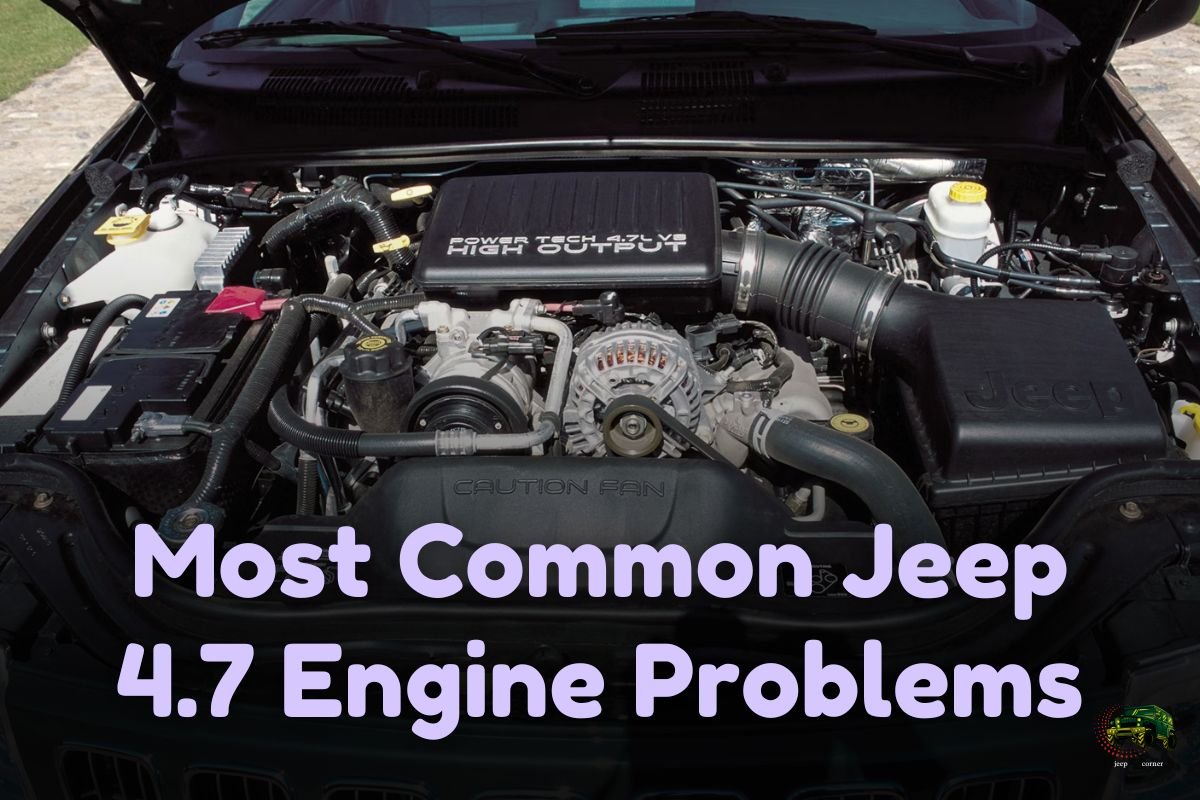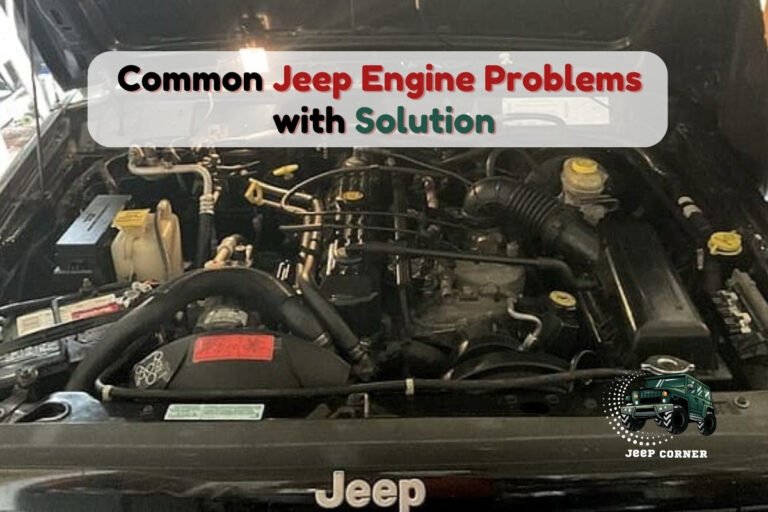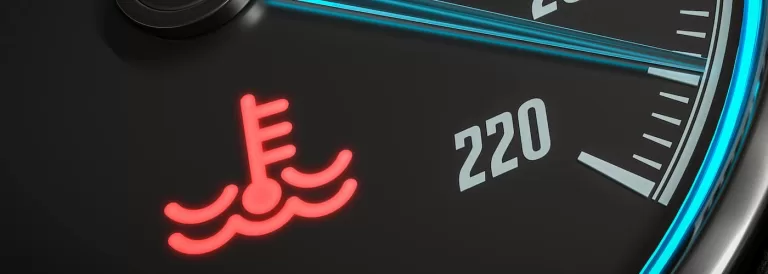Most Common Jeep 4.7 Engine Problems: Everything You Need to Know
The first V8 4.7L Powertech engine was produced by Chrysler almost four decades ago and it hit the streets in 1999 after being developed by the Motors Corporation of America. It’s a Chrysler-made gasoline engine that was formerly installed in various Jeep and Dodge vehicles.
You should be aware of the most common jeep 4.7 engine problems if you want to acquire one of these cars. While having this engine in your Jeep, you may face problems like spark plug failure, low oil pressure, a chain reaction of escalating complications, and some more issues.
The performance of the Jeep’s 4.7-liter V8 has been adequate for quite some time. In this article, we’ll discuss the Jeep 4.7 engine, including its features, common issues, and possible performance levels.
Table of Contents

What Kind of Performance Can You Expect from a Jeep 4.7-Liter Engine?
We can expect a very good performance from the jeep 4.7-liter engine. If you are new to this, you can get involved in our thoughts about it. Below we are going to talk about the benefits of the jeep 4.7-liter engine
- The cast-iron cylinder block of the 4.7L PowerTech has a bore spacing of 4.09 inches
- A deck height of 9.09 inches (231 mm) at a right angle to the cylinders.
- This engine’s block was designed from scratch; therefore all of the dimensions are unique
Different Jeep versions and regular Overland models both used this variant. Additional features of the 4.7L
- High- Performance motor includes a compression ratio of 9.7:1
- Redesigned camshafts
- Two knock sensors
- High-compression fluted pistons
- Modified Intake

Most Common Jeep 4.7 Engine Problems (Explained)
In this article, we will be talking about all the problems of 4.7-liter V7 engines in Jeeps, along with their solutions. So stay stuck to get your problems solved.
Mechanical Difficulties
Mechanical issues are one of the most problematic cases for a 4.7-liter V8. There might be some major problem with your engine, but the root cause has been traced back to a lack of routine maintenance.
It doesn’t matter if the car’s owner has receipts showing that they’ve kept up with routine maintenance; problems can still arise.
Metal shavings and not replacing parts when they need to be replaced are just some of the warning signs that could cause the engine warranty to be null and void.
Disturbance
The 4.7 engine’s excessive loudness is a well-known flaw. For some clients, this is a major issue, while for others, it’s merely an annoyance.
When there is a problem with the exhaust seals, this can occur. In this manner, a firecracker noise will be heard whenever acceleration is used.
Another possible cause is a valve making contact with the piston. When this occurs, it’s because of a catastrophic breakdown in the engine. Therefore, the two most common causes of engine noise are an inadequate amount of quality engine oil and a loose connection between both the throttle and piston.
Oil Tension
Low oil levels are a typical issue with Jeep 4.7 engines. Your Jeep’s engine performance will suffer severely as a result of this problem. Furthermore, the thickened oil in the motor will cause operational problems.
The issue appears when the lid hinges and filler plug are in horrible condition. The process of enlarging either material is cumbersome. And that means your car’s oil could go stale before it normally would. More problems could develop later on if you don’t fix this one right away.
Overheating
The most typical and dependable symptom that your Jeep’s head gasket needs replacing is an overheating engine.
When an engine’s head gasket fails, compression drops and the motor has to work harder to generate the same amount of horsepower.
Furthermore, holes form in the engine block where the coolant can escape if the head gasket has blown. When everything is said and done, your car’s engine is overheating because there isn’t enough coolant.
Spark in Plugs
It has been reported that several Jeep owners have had engine trouble. This is not an inevitable problem, though, for such 4.7 engines.
After a while, spark plugs might cause sparks to be released at the incorrect moment. This can be achieved by routinely inspecting the state of the ignition plugs. Even if your car is brand new, you should still inspect the plugs.
After 90,000 miles on the road, the issue may become noticeable. It’s also possible for cracks to show up anywhere in the engine. This issue can be easily fixed, so there’s no need to stress.
Exhaust White Smoke
Even if your Jeep’s exhaust is belching out a bit of white smoke, there’s no need to panic. You need to keep an eye out for a rise in exhaust fumes. That’s a surefire symptom of engine trouble, like a blown head gasket.
And often the cooling fluid is a combination of liquid and diethyl ether or polyethylene glycol. So burning this mixture in the engine releases water vapor into the engine exhaust, creating white smoke.
Oil Leakage
Black streaks from your car in the parking lot are a solid sign of an oil leak. Initial signs of oil leakage may be minimal so we must act quickly, or it will spiral out of control.
The improper design of the oil reservoir is the root cause of this problem. It could also be due to an issue with the motor gasket or the crankcase gasket.

How to Fix a 4.7-Liter V8 Engine?
As we have promised you before, we will also be talking about the solitons, so here we are with the most accurate answers to those problems. If any of the above-mentioned problems resembles your situation, you can solve it very easily by reading the solutions below.
Spark Plugs
For starters, admit that it occurs because of a lack of upkeep. In addition, this problem is prevalent in older or pre-owned automobiles.
The solution is to drive your Jeep less frequently. However, to extend the life of your Jeep’s engine, you should drive more gently.
Oil Tension
First and foremost, be sure you get the oil changed at the proper intervals. You should also think about switching to synthetic motor oil that is both light and of high quality.
In addition, have an expert help you when it’s time to change your car’s engine oil.
Disturbance
Heating the engine before utilizing the car is a practical solution to the problem. In colder climates, though, the engine barely warms up at all.
When the motor is at the proper temperature, the metal expands properly. The metal’s vibrations produce an unpleasant noise if this doesn’t occur. On top of that, internal fluids should be applied regularly. Still, it’s highly recommended that you seek the advice of an expert.
Oil Leakage
The only option you have is to take the car to a repair shop. You should take your car to a repair shop and let the mechanics deal with the issue, probably by making a fuel pump replacement.
Overheating
You can crank the engine by shifting to neutral or park. As a result, both the turbine and the piping system will run at increased speeds, bringing more air and liquid to the radiator.
The engine temperature drops as a result of the increased airflow. You need to stop and pop the hood.
What are the 4.7L V8 engine’s shortcomings?
When an engine becomes too hot, the head gasket and the valve seats fail. Overheating happens when the cooling system fails and parts aren’t replaced promptly. A blown head gasket or failed valve seat due to an overheated engine can result in extensive and costly damage.
If you’re in the market for a pre-owned vehicle with a 4.7L V8 engine, you should check to see that the cooling system has been regularly serviced.
Keeping up with regular oil changes is also essential if you want this engine to endure a long time. The majority of Dodge 4.7L V8 mechanical problems are attributable to overheating, which is usually the result of insufficient cooling systems.
However, if the underlying causes of the engine overheating aren’t fixed right away, the engine block could shatter or the engine could become inoperable.

FAQs
Do you still have questions? We have got the FAQ section to answer all the possible questions you may have.
Is Jeep’s 4.7-liter engine a good one?
Generally speaking, the 4.7L Magnum motor is a dependable choice. But as it continues to age, more problems become fair game.
If you take good care of your Chrysler 4.7 PowerTech, it should provide you with many dependable miles.
When it comes to Jeeps, how long do 4.7 engines typically last?
The 4.7L in Grand Cherokee is built to last and with an average lifespan of 20 years or more and two hundred thousand miles. You can hope to get your money’s worth out of it.
Conclusion
If you regularly inspect your Jeep, you may have noticed that the most common jeep 4.7 engine problems can be easily fixed. Nonetheless, these problems should not be neglected and should be addressed immediately.
Knowing the policies of both your insurance company and the automaker when it comes to service and repairs is also crucial. The foregoing problems and their answers should encourage you to treat your car with the respect it deserves.








